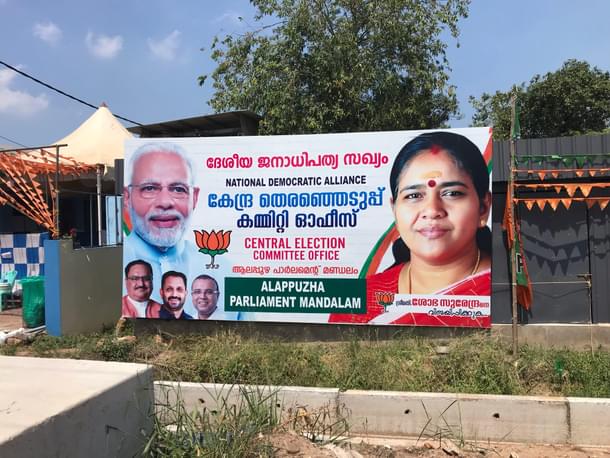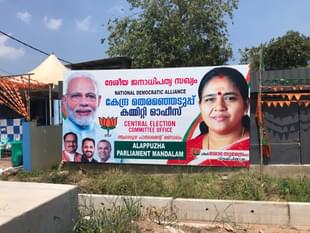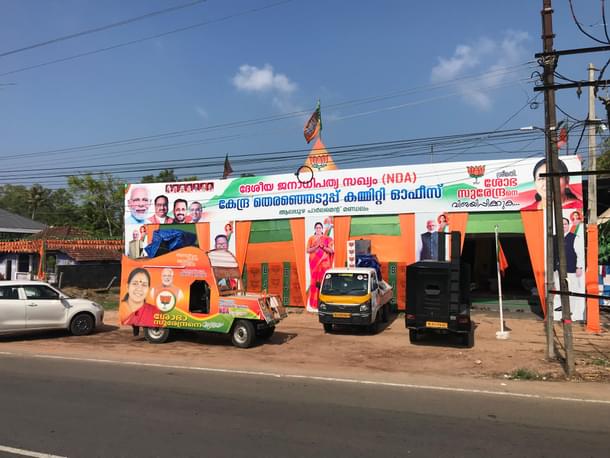Ground Reports
Lone Seat Won By LDF In 2019, Alappuzha Witnesses A Slick BJP Campaign In 2024 - Ground Report
Venu Gopal Narayanan
Apr 15, 2024, 08:25 PM | Updated Apr 16, 2024, 04:41 PM IST
Save & read from anywhere!
Bookmark stories for easy access on any device or the Swarajya app.


The tropical coastal Lok Sabha seat of Alappuzha is a thin sliver wedged between the Arabian Sea and the romantic backwaters of Vembanad Lake. The contest here, as in many other constituencies of Kerala, normally doesn’t make national headlines since the outcome is merely a function of who successfully corrals more of the decisive identity vote – the Marxists or the Congress.
But, in 2024, there is a strong buzz around Alappuzha for multiple reasons.
One, it is the only seat in Kerala which the Left won in 2019, albeit by the narrowest of margins; the rest went to the Congress and its allies.
Two, the Congress candidate is KC Venugopal, who won from Alappuzha in 2009 and 2014. He is up against sitting Marxist MP AM Ariff. The word on the street is that Venugopal was dispatched to Alappuzha since not many in the Congress wanted to contest against a Muslim candidate. This is how sensitive Malayalee secularism is.
The third reason is a surprising one: Alappuzha is turning into a dark horse race.
The Bharatiya Janata Party’s (BJP) candidate, Shobha Surendran, is running a sharp campaign, and turning up the heat on both the other candidates. And propelling her surge is a well-organized, well-run campaign team made up of karyakartas who know their onions.
It may not seem that way at first glance. The campaign office is a tiny decrepit building on the highway swathed with buntings, banners and flags. A youngster stands stooped in contrition, at the receiving end of a mighty rocketing from a senior, for not having delivered mikes and speakers to their appointed place on time.
Behind the duo, three members of the IT cell stand to one side, frowning in unison, as the person with the login key for their systems has yet to arrive. A harried coordinator is bawling on the phone, ensuring that a thousand moving parts, required to maintain the candidate’s programme for the day on schedule, stay in place. To top it all, there is someone from Swarajya on the election beat, asking them countless questions. And it is only 9 AM.
Then, tea is served, and like magic, the mood changes. Light banter develops. The junior reports the mikes are en route to where they should be. The senior smiles. The IT team get to log in, and begin their bruising duty of ensuring that a live feed of Shobha Surendran’s meetings and speeches can be broadcast live online.

P Vijaykumar, the Alappuzha in-charge, sips his beverage reflectively and says that there is a qualitative change between 2019 and 2024. “I am seeing things which I have not seen before in 35 years of party work”
What might those be? He says there is much anger among voters against the Pinarayi Vijayan government, but unlike in the past when the complaints were directed to the Congress, now, the complaints go to the BJP. It is an important shift since it indicates that more people now see the BJP as a natural party of power.
There is also far less animosity towards the BJP now. People are finally starting to see through the secularist narratives of anti-minority alarmism since they have benefited from central government schemes sans discrimination or corruption, says Vijayakumar. The direct benefit transfer system is working in Kerala, and they know where it is coming from. To the extent that, an increasing number of Christians and, surprisingly, Muslims, though still a minority, have developed the confidence to openly tell BJP campaigners that while they may not yet be BJP supporters, they do like Narendra Modi.
The Modi effect is more prominent now, and becoming increasingly widespread. This, Vijaykumar believes, is being usefully amplified by a candidate effect.
Ms Surendran is popular, well known in the constituency, and quite a hit amongst women voters. On more than one instance, old women bent to touch the BJP candidate’s feet (this is a big thing in Kerala because, unlike most of India, where showing respect to elders by touching their feet is commonplace, the practice is reserved for special occasions in this state).
Advocate PK Binoy, BJP District Vice President for Alappuzha, offers more insights. The party’s messaging focus has been on development, and this is apparently being well received by voters.
But what about the opposition’s narrative of a ‘fascist’ BJP, ‘Manipur’ (code in Kerala for anti-Christian), and CAA (code for anti-Muslim)? Campaigners say they encounter little of this on the ground. Instead, the discourse revolves around issues of development.
While this is music to a BJP supporter’s ears, the big question is if this will translate into votes; and if, yes, then how much?
Can the BJP really defeat the Congress and the Left in Alappuzha? With nine crucial days of hectic campaigning left, the answer is still up in the air.
A senior BJP member offers an interesting perspective: if Shobha Surendran gets more than 20 per cent of the popular vote, and there is every indication that she will, then KC Venugopal is sure to lose. Another says that the prana pratishtha ceremony at Ayodhya, along with the distribution of the akshata, has had some impact in Kerala. A third is confident that the BJP is attracting significant votes from both the Congress and the Left, turning Alappuzha into a triangular contest.
A fourth says that, for the first time, the BJP is gaining significant traction among the fishing and shrimp-farming communities, both of whom now look to the centre for any and all solutions to their desperate situation (note, again, the novel tendency to admit that since the state government is incapable of fixing structural issues, it is better to support the BJP at the centre; this is something which the candidate expounded upon at length, and will be covered in a forthcoming companion piece).
And a fifth campaign manager, speaking independently to this writer, confidently states that the BJP candidate has already taken poll position in one of the seven assembly segments which make up Alappuzha. That is important, since the BJP’s performance in 2019 was under 20 per cent in five of seven segments (it polled around 21 per cent in Kayamkulam and Karunagapally segments).
Nonetheless, all of this also actually makes sense because of the economic mess Kerala is presently in. The golden years of being a remittance economy, insulated from economic turmoil, are now drawing to a close. Investment is next to nil, unemployment is rife, and the state government is reaching a stage where the financial crisis it has created, and which engulfs Kerala, is now preventing it from satisfactorily providing basic services because of an acute shortage of funds.
More and more Malayalees are now realising that they too need to be a part of the new India story, if they are to make ends meet. HDI is not FDI. One solution they see around them, is a vote for the BJP. If that happens, and if Shobha Surendran is able to increase the BJP’s vote share substantially in Alappuzha, the political impact will be tectonic; and irrespective of the 2024 outcome, its reverberations will be felt with heightening intensity as the 2026 assembly elections draw closer.
This report is part of Swarajya's 50 Ground Stories Project - an attempt to throw light on themes and topics that are often overlooked or looked down. You can support this initiative by sponsoring as little as ₹2999. Click here for more details.
Venu Gopal Narayanan is an independent upstream petroleum consultant who focuses on energy, geopolitics, current affairs and electoral arithmetic. He tweets at @ideorogue.





